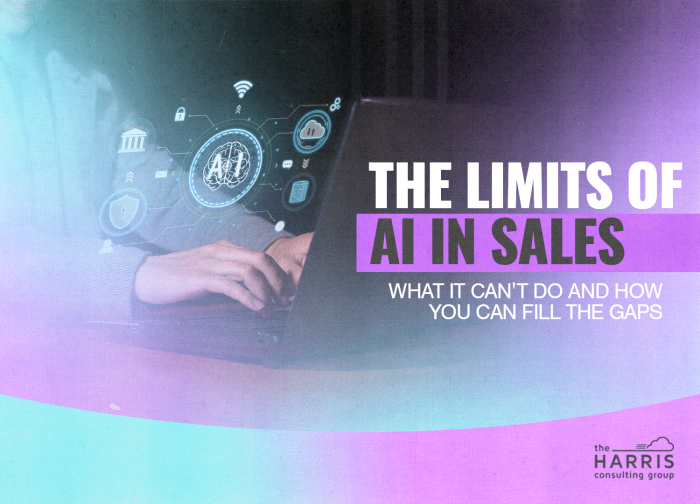Artificial Intelligence (AI) has revolutionized the sales landscape, empowering businesses with data-driven insights, automation, and enhanced customer engagement. However, it’s crucial to understand that AI in sales has its limitations.
While AI excels at various tasks, it still lacks emotion. AI lacks the humanity that is required in some sales. AI lacks compassion, and AI lacks empathy. Will it get there? It certainly seems so. How soon? Well, that depends on the specific skills you think AI can replace.
We will explore what AI in sales cannot do and how human touch can fill these gaps. We’ve said it before, there is no such thing as a Buyer’s Journey, there is only the Buyer’s Experience.
Building Genuine Relationships
Building genuine relationships, handling complex negotiations, understanding unstructured data, and nurturing creativity are aspects where AI falls short. Despite AI’s analytical prowess, it cannot yet replace the authentic human connection necessary for building lasting customer relationships.
AI in sales cannot navigate nuanced negotiations that each customer will need to feel understood in their purchasing decisions. AI in sales cannot easily interpret ambiguous data and adjust in a humanizing way.
Lastly, AI cannot easily work through a complex sales cycle involving 10+ humans and 3+ departments in a way that encapsulates the ultimate buyer’s experience.
Human Skills vs AI
Sales professionals can maximize their effectiveness by leveraging AI as a complement to human skills. They must strike the right balance between technology and the personal touch required in the dynamic sales environment.
AI can:
- get you closer to the goal line, but it cannot always get you over the goal line.
- research for you, but it cannot write the term paper in a way that connects human to human.
- write the blog post, but does it sound like Richard unless Richard punches it up a bit?- We think not.
AI plays a crucial role in sales by efficiently analyzing vast amounts of data to identify potential leads and personalize communication. It automates routine tasks, enabling sales teams to focus on strategic initiatives and high-impact interactions.
However, despite its analytical capabilities, AI in sales falls short when it comes to building authentic human connections. This is a cornerstone of lasting relationships in sales. While a personalized email or chatbot interaction can set the stage, it can only go so far in establishing genuine trust with customers.
Sales professionals must step in to foster connections that go beyond automated responses. Humans have a strong need to be heard and understood. In some cases for small transactions, a digital experience and interface are fine. In larger purchasing decisions, a human is required.
The Ability of Listening
The key to sales is not about talking it is more about listening. And while AI can “listen” to more data faster than a human. It cannot customize and craft that data into a story and narrative in such a way that the customer feels heard.
Understanding customer pain points and tailoring solutions to meet specific needs requires a nuanced understanding. This is something that only human-to-human intuition and empathy can provide.
To bridge the gap between AI-driven insights and authentic relationship-building, sales professionals should invest time in understanding their customers on a personal level. While AI can offer valuable data points, it’s the human touch that adds the crucial layer of understanding.
Salespeople can leverage AI in sales by using it to gather data on their customers’ backgrounds, preferences, and unique challenges. Sales professionals must study this information and learn how to use it wisely to establish a deeper connection. This type of relationship goes beyond the surface-level interactions facilitated by AI.
Leveraging AI as a tool to initiate conversations and gather information is essential. However, the real magic happens when interpersonal skills and emotional intelligence take over. Human interaction brings a level of warmth and understanding that is difficult for AI to replicate.
It involves active listening, recognizing subtle cues, and responding empathetically to customer needs. These elements contribute significantly to the development of trust and long-term relationships.
Handling Complex Negotiations
Purchases are now made by teams, not groups, and not individuals. The human is vastly afraid to decide on their own and organizations have built up a tremendous amount of red tape to get these decisions made.
Selling into an organization is more like surviving Squid Games than playing Whack-A-Mole. There are multiple teams and multiple members on each team we must navigate through. And the water is thicker than the chocolate river in Willy Wonka.
With this many people being Negotiations in sales often involve a delicate interplay of nuance, emotion, and unpredictable variables that make them inherently human-centric. While AI algorithms excel at analyzing historical data and suggesting optimal pricing strategies, they fall short when it comes to navigating the subtleties of human negotiation.
The Human Art of Negotiation
The art of negotiating extends beyond numerical analysis. It requires the ability to comprehend and respond to a complex array of human emotions and motivations. Compromise, empathy, and a deep understanding of the unique dynamics at play are skills that remain firmly in the realm of human expertise.
Making sure everyone on every team feels heard, understood, and appreciated for their role in the decision. In this context, sales professionals play a pivotal role in honing their negotiation skills. Salespeople must delve into the intricacies of customer motivations, and remain agile enough to adapt their strategies in real time.
If you were a buyer, would you trust negotiating with a machine at this stage? Would you trust the machine is being fair? Would you feel like you’ve been heard? Unless it’s a transactional sale negotiations have to be left to humans to conduct with humans, period.
AI in sales may be supportive in giving humans information to be used in the negotiations. However, it cannot do the negotiating for you at this stage. In a B2C (Business to Consumer) world, that is already happening. It will take some time for it to be effective in a B2B world.
Understanding Unstructured Data
AI excels at processing structured data, but it struggles with unstructured information such as ambiguous customer feedback, social media sentiments, and nuanced conversations. Human intuition and contextual understanding are essential for interpreting these unstructured data sources accurately.
What you can do: Use AI-generated insights and the real-world context to extend your ability and reach into the emotional part of the buyer’s experience. Use this information to meet your customer in their headspace.
Use your judgment to interpret unstructured data and extract valuable insights that may not be apparent to AI algorithms. Stand on the shoulder’s of AI and you will reach unlimited potential
Nurturing Creativity
Creativity is a uniquely human trait that drives innovation and problem-solving. While AI can analyze patterns and suggest solutions based on historical data, it lacks the creative spark necessary for out-of-the-box thinking. Sales situations often require inventive approaches to stand out in a competitive market.
What you can do: Embrace creativity in your sales process. Use AI as a tool to streamline routine tasks, allowing more time for brainstorming creative solutions to complex problems. Think beyond data-driven strategies to find unique ways to address customer needs.
AI is Coming For Sales Jobs
AI is coming for your sales job. Just like it came for the farmers. Just like it came for the assembly line workers, and just like it came for the checkout line at the grocery store. AI will take away roles in the sales world.
If you are in sales in 2024, your priority is to hone your skills to become an enterprise salesperson as soon as possible. The SDR role is shifting and may evaporate first. Followed by some SMB closing roles.
And certainly, some Mid-Market AE roles will last a bit longer. The true Enterprise sales role has the greatest advantage of surviving the longest as AI takes over sales. Enterprise deals have the longest sales cycles, and the most number of decision-makers, and are negotiated at varying levels of complexity a machine cannot do.
And there is one other role that may be safer than the enterprise sales role. That could be the role of Customer Success. When something goes wrong, humans want to talk to humans, not machines. When someone wants to buy more of something or add on, humans often want to talk to humans.
Conclusion
AI has undoubtedly transformed the sales landscape. It offers businesses valuable insights and streamlining operations through the automation of repetitive tasks. The efficiency gains and data-driven decision-making facilitated by AI have significantly contributed to the evolution of sales processes.
However, it’s crucial to recognize that while AI excels in specific areas, there are inherent limitations to its capabilities. The human touch remains irreplaceable when it comes to the nuanced aspects of sales, such as:
- building genuine relationships,
- navigating complex negotiations,
- interpreting unstructured data, and
- fostering creativity.
In the dynamic realm of sales, building genuine relationships goes beyond the capabilities of AI-driven tools. Establishing trust and rapport with clients requires a level of empathy, emotional intelligence, and authentic connection. These are aspects that human sales professionals uniquely provide.
Thus, it is crucial to train your team not only on the use of AI during sales processes but also on their soft skills. The combination of innovation and human touch is crucial to succeed in the sales world and stand out in the competitive arena.







